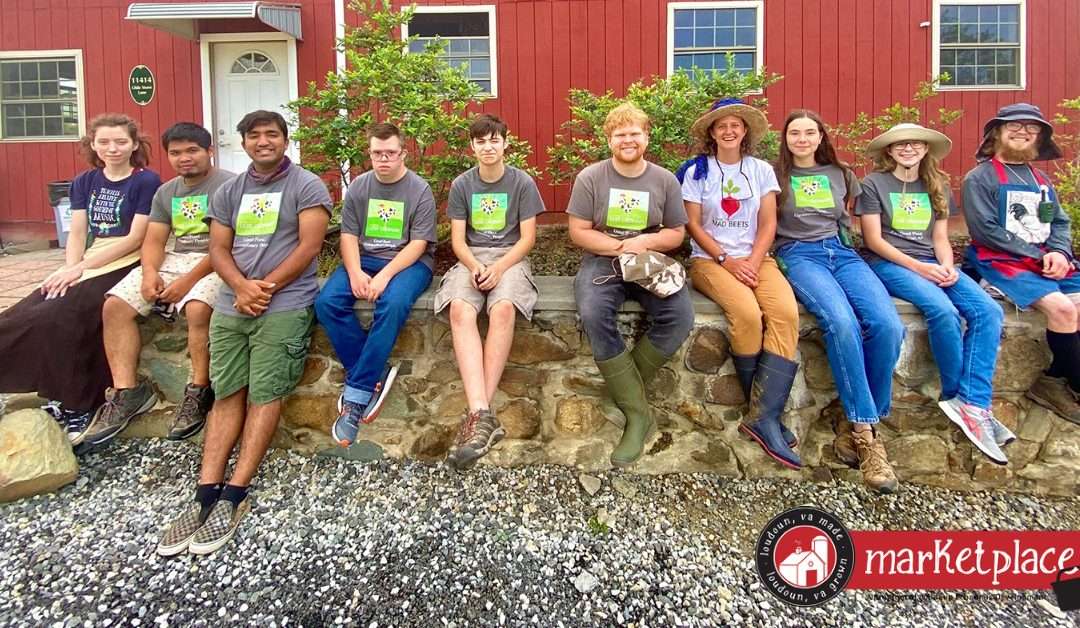“A lot of these folks haven’t really been given chances. Our society hasn’t given them the opportunities that it could or should.” (The Winchester Star, 2019)
Greg Masucci and his wife Maya Wechsler are on a mission with their nonprofit farm, A Farm Less Ordinary, which provides fresh food to the Loudoun community while providing a nurturing environment, life skills, and job opportunities to adults with intellectual and developmental disabilities.
Nationwide, the unemployment rate for people with intellectual and/or developmental disabilities is around 81%, which is 20-times the national average. Even in Loudoun County, 62.7% of people with intellectual and developmental disabilities are unemployed or out of the workforce. Places like A Farm Less Ordinary look to reduce that trend locally by offering paying jobs at or above minimum wage.
This hits home for Masucci and Wechsler, who have a son, Max, who is, autistic and nonverbal, with sensory and attention challenges that cause him to need constant care.
“Max was the inspiration for the farm, but he wasn’t the whole reason for the farm,” Masucci told Voice of American in 2019. “When people are not in the employment picture, they end up being socially isolated and it puts a financial burden on families.”
In Virginia and surrounding areas, people with intellectual and developmental disabilities have options and resources through the age of 22, at which point their schooling ends.
Once the school bus stops showing up, then what?
“If you don’t like the story then you need to change the script,” Masucci told WUSA-9 in 2016. “We realized that in order to create a happy ending, we had to change our script drastically.”
Even though Masucci and Wechsler were self-proclaimed “city people” living in Washington, D.C., life in the city was not conducive to what they needed. They yearned for a simpler, safer and happier quality of life. In 2014, Masucci stepped back from his realty business and purchased a 24-acre farm in Bluemont.
Despite knowing very little about farming, Wechsler poured herself into it for the first year, taking business classes, beginner farming classes and reading as many books as possible.
Then in 2016, they were ready to launch AFLO.
https://vimeo.com/174469933
Since then, the dream has grown with the people and the produce and products that they create.
In 2016, they hired five workers with various intellectual disabilities and started a CSA program. The next year, they hired additional support for their workers and started welcoming volunteers in to assist. They also partnered with Loudoun Hunger Relief to provide nutritious food to families in need. They also added a hoop house to extend the growing season, a chicken coop to begin offering eggs, and attended their first farmers market.
By 2018, their employment had grown to 20, including branching out into value-add products like jellies and jams. By 2019, they opened a second location in Leesburg, making it easier to reach their workers and customers.
Along the way, they’ve engaged with dozens of community partners, including the occupational therapy program at Shenandoah University. After paying a visit to the farm, students helped identify ways to adapt tools for easier use by the workers.
“Farming really helps people with developmental and intellectual disabilities because it’s a lot of small tasks that you need to do with your hands. A lot of people might not have great hand-eye coordination, and it’s also a lot of fine motor skills, which can be really difficult,” Farm Manager Heather Richardson explained to VOA in 2019. “They can learn, ‘Alright, the world may be set up this way, but I can make accommodations for myself. I can go outside the box and create a tool that’s going to help me get the job done, no matter what.'”
In 2020, despite the COVID-19 pandemic, AFLO continued its impressive growth. Being outside continued to be important for workers, and customers gained a different perspective on the importance of supporting local farms. AFLO purchased farmland in Lovettsville and moved its base of operations from Bluemont to the new fields for 2021 and beyond.
At a grand opening ceremony in June 2021, grower Emma addressed a group of elected officials and friends of the farm, saying: “I want to thank A Farm Less Ordinary for giving me the opportunity to work here and educate me on growing plants. It is amazing to watch seedlings grow from the greenhouse to the garden to the table…Working at the farmers market and being the cashier is an absolute blast. I am extremely grateful for the amazing friends that I have made.”
“We want to be a stepping stone. If somebody wants to continue to work here, that’s great, but if they get another job, we’re thrilled, ” Masucci told VOA. “It feels very good when we hear about employees who have gone on to get jobs. We’re thrilled because we feel like we have a little bit to do with their success story.”
View this post on Instagram
“We moved out here to build our own tribe and surround ourselves with similar people,” Wechsler added. “I think we’ve succeeded in that.”
[minti_button link=”http://example.com” size=”large” target=”_self” lightbox=”true” color=”color-1″ icon=””]Shop from AFLO on the Marketplace[/minti_button]
You can also find A Farm Less Ordinary at the Cascades Farmers Market on Sundays.
Current products being grown at the farm include:
- Sweet Peppers;
- Cauliflower;
- Eggplant;
- Tomatoes;
- Zucchini and yellow squash;
- Napa Cabbage;
- Kale;
- Beans;
- Diakon Radishes;
- Flowers;
- Onions;
- Potatoes;
- Lettuce;
- Beets;
- Basil;
- Swiss Chard.






